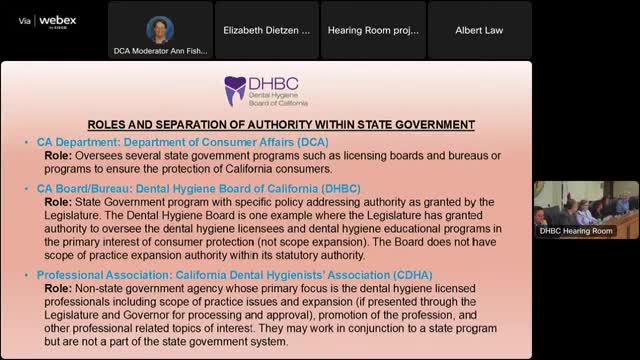Board debates authority to interpret scope of practice as members, public, experts weigh in
Get AI-powered insights, summaries, and transcripts
Subscribe
Summary
Board members, staff and public commenters discussed whether and how the Dental Hygiene Board can interpret dental hygiene scope of practice (RDH/RDHAP), and how subject-matter experts are used in enforcement and policy work.
Members of the Dental Hygiene Board of California and several public commenters discussed the board's role in interpreting scope of practice, how the board uses subject-matter experts and what legal limits exist on scope expansion.
Executive Officer Anthony Lum told the board staff had contacted other boards for precedent and that scope interpretation can depend on how statutory language is written. "If they can elaborate on scope issues, you have to have that authority first," Lum said, explaining that some boards have more prescriptive statutory language that explicitly allows the board to define and interpret scope.
Board member Michael Long had requested staff research how other Department of Consumer Affairs boards approach scope interpretation. Staff reported that some boards, including the Respiratory Care Board, had pursued statutory language to make it explicit that the board had authority to define and interpret its profession's scope.
Multiple public commenters and members of the public underscored the consumer-protection rationale for clearer interpretation. Rachel Doherty said the board should "conduct a review with whatever experts necessary to define the scope in order to prevent improper practice rather than just for investigative purposes only." Public speaker Joanne Galliano (longtime hygienist and SME in meeting discussions) said that enforcement experts routinely inform cases but that interpretation beyond enforcement may require clearer statutory language.
Board members asked procedural questions about how experts are engaged. Anthony Lum said the board uses contracted experts and consulting licensees for enforcement cases and scope questions that arise during investigations and that the DCA-assigned attorney advises the board. When asked whether board members could submit names of potential subject-matter experts, Lum said the board posts an application on its website and will accept nominations and applications.
The board did not take formal action to change scope language at this meeting. Members discussed adding scope interpretation to future agendas and noted that pursuing statutory changes to expand or clarify scope would require legislative sponsorship and broader policy discussions.
Why it matters: how the board defines or interprets scope of practice affects what services licensees may lawfully perform and how enforcement staff handle complaints. Participants said clearer processes would help both consumer protection and licensees who want clarity on permissible practices.
Key attributions (selected): - Executive Officer Anthony Lum explained the legal limits and that interpretation depends on statutory wording. - Rachel Doherty urged the board to "conduct a review with whatever experts necessary to define the scope."
